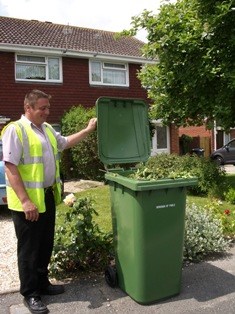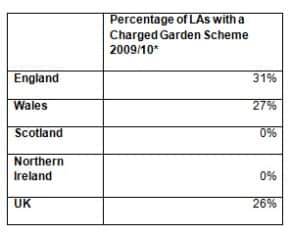Uttlesford district council in Essex, Poole borough council in Dorset, Kirklees in West Yorkshire and the Merseyside Waste Disposal Authority have all outlined plans over the last month to introduce charges.

They join a plethora of other councils already running a subscription service, such as Oxford city council and all the waste collection authorities in Surrey and Northumberland.
The charges which average at around 25 a year – are being proposed to help councils generate income in the face of local authority budget cuts of 26% over the next four years.
Under the Controlled Waste Regulations 1992, garden waste is classified under Schedule 2 as a type of waste for which a charge can be made – which is not the case for other waste streams, such as food waste.
According to WRAP, 26% of UK councils had a charged-for garden waste collection service in 2009/10 (see table below).
Sara Jones, manager of the local-authority-led Waste Improvement Network (WIN), told letsrecycle.com that a Focus guide to introducing subscription-based services for garden waste had been downloaded 407 times from WINs website since being published in August 2010 demonstrating the high level of interest in such schemes.
The document brings together advice, top tips and lessons learnt from those councils which have already started charging for their garden waste collection services.
I think more local authorities are looking at this in terms of income generation which they are exploring for obvious reasons, she said. This remains an area where they can do it, when the government has been steering councils away from what it calls bin taxes.
Ms Jones added that the answer to the question can we introduce a charged for or subscription service for garden waste? was currently one of the most popular on the WIN website.
Advantages

According to the WIN Focus document, the advantages of introducing a subscription-based garden waste service include the creation of extra revenue for the council and an incentive for householders to home compost their organic waste. It also claims that it is a fairer system financially, as those who do not use the service do not end up paying for it through their council tax.
On the downside, however, it says that such schemes can cause public dissatisfaction, increase garden waste arisings in those properties taking part and reduce the tonnages of garden waste collected on commencement of the scheme and thereby reduce recycling rates.
Evidence of this can be found on Kirklees councils website, where one resident commented on plans to charge 1 per bag of garden waste, with a minimum of 5, from October 1 2011. He said: As per usual it hasnt been thought through, or will we now be allowed to put garden waste in the grey bin?
As a result of problems such as this, the Focus document says effective communications are crucial: A full public consultation is likely to be required and communications are paramount in order to gain public support, encourage participation and to avoid risk issues such as contamination and low participation.
A spokesman for WRAP said that it was currently auditing figures showing how many councils were charging for green waste in 2010/11 so it was hard to say if there had been an increase compared to 2009/10.
Related Links
He added that WRAP does not have any published guidance for councils on garden waste collections, but that it would be adding to the material produced by WIN.
He said: WRAP is adding to this information by providing additional fact sheets and case studies on approaches taken by local authorities to introduce subscription based services.








Subscribe for free